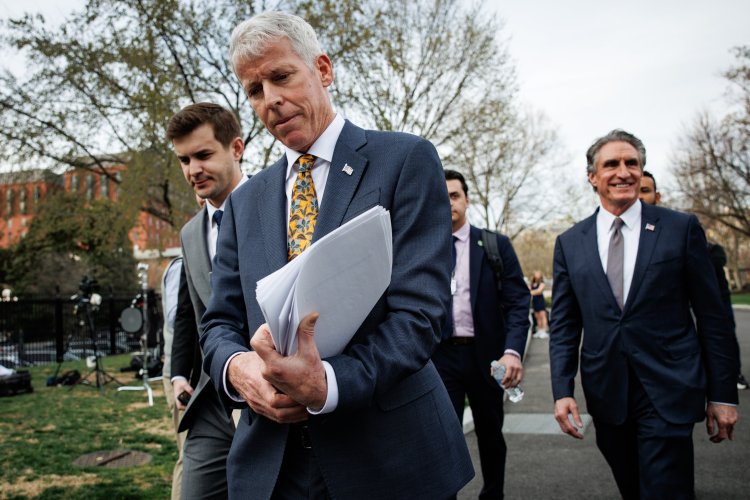Trump's DOE considers cutting climate funds for blue states, while sparing red states.
If implemented, the cuts would infuse politics into the federal funds that Congress and the Biden administration allocated to seven regional applicants under the bipartisan infrastructure law.

If implemented, these cuts would introduce a political dimension to the federal funds allocated by Congress and the Biden administration to seven regional applicants as part of the bipartisan infrastructure law.
The proposed funding reductions come in the wake of President Donald Trump's directive aimed at reducing government waste and cutting climate-focused initiatives established during the Biden administration. Past proposals from the Department of Energy (DOE) included the possibility of eliminating federal funding for all seven of the hydrogen hub projects.
The initial disbursements of funds for the selected hubs, part of a $7 billion initiative, were made to recipients before the Biden administration left office. These sites were designed to accelerate the development of hydrogen as a clean fuel, which could contribute to lowering greenhouse gas emissions in hard-to-decarbonize sectors like fertilizer production, steel manufacturing, and electricity generation.
A spreadsheet of the projects, prepared by the DOE and acquired by PMG, categorized each hub as either “cut” or “keep.” Of the seven projects, only the four planned for mostly Democratic-leaning states are at risk of having their funding reduced, as per individuals familiar with the latest iteration of the proposal.
The hubs facing cuts include: the Pacific Northwest hub, which spans Oregon, Washington, and Montana; the ARCHES hub located in California; the Midwest regional hub connecting Illinois, Indiana, and Michigan; and the Mid-Atlantic hub in Pennsylvania, Delaware, and New Jersey.
The hubs marked for continued funding are the Heartland hub covering Minnesota, South Dakota, and North Dakota; the Appalachia hub in Ohio, Kentucky, West Virginia, and Pennsylvania; and the HyVelocity hub in Texas and Louisiana.
The hubs expected to retain funding include those that utilize natural gas with carbon capture, while the Midwest hub will also depend on natural gas. In contrast, the three hubs proposed for cuts would be powered primarily by renewables or nuclear energy.
Moreover, Interior Secretary Doug Burgum, previously governor of North Dakota, expressed support for the Heartland hub's selection.
Frank Wolak, CEO of the Fuel Cell and Hydrogen Energy Association, indicated that the list originated from the DOE but highlighted uncertainty about the administration's final decisions.
Wolak mentioned that Congress authorized the funding for these projects, meaning lawmakers would need to formally rescind those funds for cancellation to occur. His organization informed several congressional offices on Tuesday about projects in their states on the cut list and urged them to contact both the DOE and the Trump administration to advocate for the investments.
“We're asking them, one to be aware that this is happening, and two, communicate to the secretary of Energy and to the administration that these are important,” Wolak noted. “They're important to their states and that they need an understanding of what is intended by the labeling of something being cut.”
Separate documents obtained by PMG reveal that DOE officials recommended sweeping cuts to various clean energy initiatives across the Office of Energy Efficiency and Renewable Energy, totaling approximately $800 million across projects for electric vehicle charging infrastructure, wind turbines, solar panels, and hydropower, among others.
Many of these projects are primarily situated in Democratic-leaning states, though not exclusively. The proposed cuts consist of a combination of spending from the infrastructure law and appropriated funds.
This proposal does not center on the Inflation Reduction Act, the 2022 legislation that marked the largest U.S. investment aimed at combating climate change.
An Energy Department spokesperson did not confirm the existence of the list concerning the Office of Energy Efficiency and Renewable Energy (EERE).
"The Department of Energy is conducting a department-wide review to ensure all activities follow the law and align with the Trump administration’s priorities," the spokesperson said in an emailed statement. "The Department of Energy is hard at work to deliver on President Trump’s promise to restore affordable, reliable, and secure energy to the American people.”
Barriers exist regarding the legal authority of the Trump administration to cut projects backed by the infrastructure law and appropriated funds. Canceling these projects could potentially violate the Impoundment Control Act of 1974, which restricts the executive branch from unilaterally withholding congressionally approved spending. Federal courts have repeatedly blocked previous attempts by Trump to enact such cuts.
Additionally, this could undermine private sector confidence in federal funding and contracts.
Most projects on the cutting list feature relatively low price tags compared to some higher-profile programs included in the Inflation Reduction Act and infrastructure law. Costs for these projects range from university research initiatives starting at $250,000 to hydrogen electrolyzer technology initiatives costing $49.6 million, with the majority priced below $10 million.
Discussion surrounding the fate of these projects, including the multibillion-dollar hydrogen hubs, has intensified over recent days. DOE officials sent a recommended list for cuts for review at the end of last week.
"We also heard that four of those hubs will be cut," stated Copeland Tucker, a spokesperson for the National Hydropower Association, who noted he did not have direct knowledge of any final DOE decisions.
White House officials and congressional Republican leaders are focusing on the hubs as they seek funds to offset $4.5 trillion in tax cuts included in their budget reconciliation plan, according to an oil lobbyist familiar with the discussions.
“There’s policy advisories in the White House and leaders on the Hill that want to see some big numbers to be chopped, for the political panache and the real-world need to find dollars for the reconciliation process,” said this individual, who requested anonymity to discuss private dialogues with lawmakers. “The size of those honey pots is attracting attention.”
Furthermore, the Trump administration has previously instructed agencies to assess whether the funding under the infrastructure law and the Inflation Reduction Act aligns with its pro-fossil fuel energy agenda.
While the infrastructure law does not explicitly mandate that seven hubs receive funding, it does establish some criteria for hydrogen production across various fuel sources, including renewables, natural gas, and nuclear energy.
Some Republicans have pushed back against the extent of the initial proposed funding reductions.
Senate Environment and Public Works Chair Shelley Moore Capito expressed hope that the administration would “rethink” any potential cuts to the Appalachian hydrogen hub, emphasizing its reliance on natural gas.
“We’ve been talking to [DOE] about that,” Capito noted.
West Virginia Republican Sen. Jim Justice stated he has been in continuous communication with the Energy Department and believes discussions about cuts to the hubs are "premature."
“At the end of the day, we’re not gonna cut anything” that expands energy production, regardless of the source, Justice asserted.
Sanya Singh for TROIB News
Find more stories on Business, Economy and Finance in TROIB business












